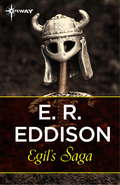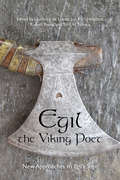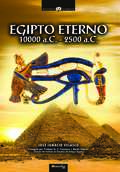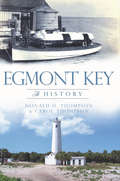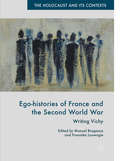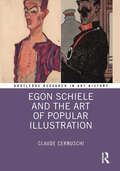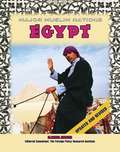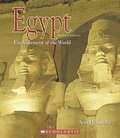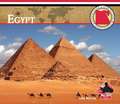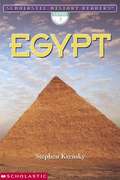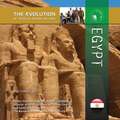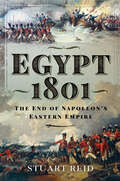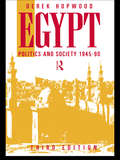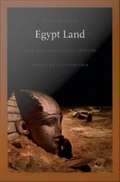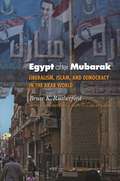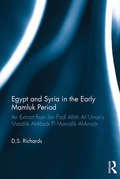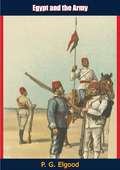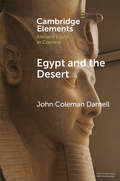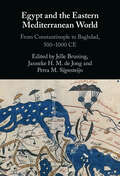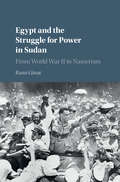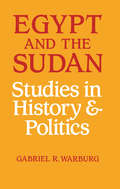- Table View
- List View
Eggs or Anarchy: to feed a nation at war
by William SitwellEggs or Anarchy is one of the great, British stories of the Second World War yet to be told in full. It reveals the heroic tale of how Lord Woolton, Minister for Food, really fed Britain. As a nation at war, with supply routes under attack from the Axis powers and resources scarce, it was Woolton's job to fulfil his promise to the British people, and Prime Minister Winston Churchill in particular, that there would be food on the shelves each week. Persuading the public to not resort to the black market and to manage on the very limited ration was one thing, but Woolton had to fulfil his side of the bargain and maintain supplies in time of crisis. A grammar school-educated genius, he was a fish out of water in Churchill's cabinet and the PM himself doubted Woolton would survive due to the unstinting criticism he faced from colleagues, the press and public. This is the story of how he battled to save his own career while using every trick in his entrepreneurial book to secure supplies. He battled to outwit unscrupulous dealers on the black market streets of cities within the British Empire - such as Alexandria in Eygpt - persuading customs authorities to turn a blind eye to his import schemes. If Britain had gone hungry the outcome of the war could have been very different. This book, for the first time, finds out the real story of how Lord Woolton provided food for Britain and her colonies and discovers that for him there were days when it was literally a choice of 'eggs or anarchy'.
Egil's Saga
by E. R. EddisonEgil's Saga is the tale of the long and brutal life of Egil Skallagrimsson, the tenth-century warrior-poet: a morally ambiguous character who was both the composer of intricately beautiful poetry and a physical grotesque capable of staggering brutality. It recounts Egil's progression from youthful savagery to mature wisdom as he struggles to avenge his father's exile from Norway, defend his honour against the Norwegian King Erik Bloodaxe, and fight for the English King Athelstan in his battles against Scotland. Translated from Icelandic by the great fantasist, E R Eddison, and accounted by many to be the greatest of the Icelandic sagas, Egil's Saga is a fascinating depiction of a deeply human character.
Egil's Saga
by E. R. EddisonEgil's Saga is the tale of the long and brutal life of Egil Skallagrimsson, the tenth-century warrior-poet: a morally ambiguous character who was both the composer of intricately beautiful poetry and a physical grotesque capable of staggering brutality. It recounts Egil's progression from youthful savagery to mature wisdom as he struggles to avenge his father's exile from Norway, defend his honour against the Norwegian King Erik Bloodaxe, and fight for the English King Athelstan in his battles against Scotland. Translated from Icelandic by the great fantasist, E R Eddison, and accounted by many to be the greatest of the Icelandic sagas, Egil's Saga is a fascinating depiction of a deeply human character.
Egil, the Viking Poet
by Russell Poole Laurence De Looze Jon Karl Helgason Torfi H. TuliniusEgil, the Viking Poet focuses on one of the best-known Icelandic sagas, that of the extraordinary hero Egil Skallagrimsson. Descended from a lineage of trolls, shape-shifters, and warriors, Egil's transformation from a precocious and murderous child into a raider, mercenary, litigant, landholder, and poet epitomizes the many facets of Viking legend.The contributors to this collection of essays approach Egil's story from a variety of perspectives, including psychology, philology, network theory, social history, and literary theory. Strikingly original, their essays will appeal not only to dedicated students of Old Norse-Icelandic literature but also to those working in the fields of Viking studies, comparative ethnology, and folklore.
Egipto eterno, 10000 -2500 A.C. (Historia Incógnita)
by José Ignacio Velasco MontesUn recorrido visual por los orígenes de la cultura egipcia, con sus mitos, los Reyes-Dioses, las primeras dinastías, una época pretérita, legendaria que nos permitirá conocer a fondo la cultura más fascinante de la historia.
Egmont Key: A History (Brief History)
by Carol Thompson Donald H. ThompsonEgmont Key has been a sentinel for ships entering Tampa Bay from the Gulf of Mexico for hundreds of years. Early European explorers recognized the island's strategic location. Its story reflects major events in the history of the United States and Florida, as the island played a role in the Seminole Wars, the Civil War, the Spanish-American War and World Wars I and II. Its lighthouse, now automated, is still a beacon for ships. For many years, people have enjoyed the beaches of Egmont Key, walked the red brick "roads to nowhere" and explored the ruins of Fort Dade. Authors Don and Carol Thompson aim to foster an appreciation of the uniqueness and beauty of Egmont Key, as well as an understanding of its place in history.
Ego-histories of France and the Second World War: Writing Vichy (The\holocaust And Its Contexts Ser.)
by Manuel Bragança Fransiska LouwagieThis volume presents the intellectual autobiographies of fourteen leading scholars in the fields of history, literature, film and cultural studies who have dedicated a considerable part of their career to researching the history and memories of France during the Second World War. Basedin five different countries, Margaret Atack, Marc Dambre, Laurent Douzou, Hilary Footitt, Robert Gildea, Richard J. Golsan, Bertram M. Gordon, Christopher Lloyd, Colin Nettelbeck, Denis Peschanski, Renée Poznanski, Henry Rousso, Peter Tame, and Susan Rubin Suleiman have playeda crucial role in shaping and reshaping what has become a thought-provoking field of research. This volume, which also includes an interview with historian Robert O. Paxton, clarifies the rationales and driving forces behind their work and thus behind our current understanding of one of the darkest and most vividly remembered pages of history in contemporary France.
Egon Schiele and the Art of Popular Illustration (Routledge Research in Art History)
by Claude CernuschiPresenting a radically different picture of Egon Schiele’s work, this study documents (in one-to-one comparisons) the extent of the artist’s visual borrowings from the Viennese humoristic journal, Die Muskete. Claude Cernuschi analyzes each comparison on a case-by-case basis, primarily because the interpretation of cartoons and caricatures is highly contingent on their specific historical and cultural context. Although this connection has gone unnoticed in the literature, in retrospect, this correlation makes perfect sense. Not only was Schiele’s artistic production frequently compared to caricature (and derided for being “grotesque”), but Expressionism and caricature are natural allies. One may belong to “high” art and the other to “popular” culture, yet both presuppose similar assumptions and deploy a similar rhetorical position: namely, that the exaggeration of human physiognomy allows deeper psychological “truths” to emerge. The book will be of interest to scholars working in art history, visual culture, popular culture, and politics.
Egypt
by Clarissa AkroydNearly 5,000 years ago, on the eastern edge of the Sahara Desert, one of the world's earliest and greatest civilizations began to flourish. That civilization, Egypt, has held a firm grip on the human imagination ever since, with its powerful pharaohs, its awe-inspiring pyramids, and its mysterious religious beliefs. But Egypt is much more than a land of unsurpassed archaeological wonders. Today, it is the most populous Arab country; it was also the first Arab nation to make peace with Israel. As this ancient land struggles with the many problems of the 21st century, it remains a vital member of the global community. Discusses the geography, history, economy, government, religion, people, foreign relations, and major cities of Egypt.
Egypt (Enchantment of the World)
by Ann HeinrichsThe contents include 'Things of Unspeakable Greatness', Desert Life, Governing Egypt, Life and Learning etc.
Egypt (Explore The Countries)
by Julie MurrayInformative, easy-to-read text and oversized scenic photos draw in readers as they journey through Egypt home of the mighty Nile River, the magnificent Great Sphinx and Pyramids of Giza, and the tomb of King Tut. Readers will learn about Egypt s history, government, major cities, land features, natural resources, culture, and more! Maps, a timeline with photos, fun facts, and pronunciation guides aid readers. The book closes with a facts page including Egypt s population and total area, as well as images of the Egyptian flag and currency. Students will find valuable report information while exploring Egypt! Table of contents, glossary, and index included. Aligned to Common Core Standards and correlated to state standards. Big Buddy BOOKS is an imprint of ABDO Publishing Company.
Egypt (Exploring World Cultures Series)
by Kate ShoupEgypt is a country that has existed for many centuries. It is a land of pyramids, pharaohs, and history. This book examines the many areas that make up Egypt, such as geography, food, sports, and traditions. It is written clearly and in an easy-to-read manner. It connects young readers to the text by using photographs and vocabulary.
Egypt (Scholastic History Reader™)
by Stephen KrenskyRead all about the secrets of ancient Egypt--from hieroglyphs to underground tombs. The Scholastic History Readers series was created especially to bring history to life for beginning readers.
Egypt (The Evolution of Africa's Major Nations)
by William Mark HabeebThe Egyptian civilization along the Nile River was one of the ancient world's earliest and most influential empires. From pyramids to mummies to hieroglyphs, the unique and mysterious lore of this region in northeastern Africa still engages the imagination. While much has changed over the centuries, Egypt remains a fascinating place. Traditionally, Egypt's moderate political stance in the Arab world has given the country a strategic place on the world stage and made it a stabilizing force in the Middle East. However, in 2011 Egypt underwent a revolution that ousted longtime president Hosni Mubarak from power. Today, Egypt faces political and economic uncertainty, as its newly elected government attempts to rule under the country's new constitution.
Egypt 1801: The End of Napoleon's Eastern Empire
by Stuart ReidThe first campaign medal awarded to British soldiers is reckoned to be that given to those men who fought at Waterloo in 1815, but a decade and a half earlier a group of regiments were awarded a unique badge – a figure of a Sphinx - to mark their service in Egypt in 1801. It was a fitting distinction, for the successful campaign was a remarkable one, fought far from home by a British army which had so far not distinguished itself in battle against Revolutionary France, and one moreover which had the most profound consequences in the Napoleonic wars to come. In 1798 a quixotic French expedition led by a certain General Bonaparte not only to seize Egypt and consolidate French influence in the Mediterranean, but also to open up a direct route to Indian and provide an opportunity to destroy the East India Company and fatally weaken Great Britain. In the event, General Bonaparte returned to France to mount a coup which would eventually see him installed as Emperor of the French, but behind him he abandoned his army, which remained in control of Egypt, still posing a possible threat to the East India Company, until in 1801 a large but rather heterogeneous British Army led by Sir Ralph Abercrombie landed and in a series of hard-fought battles utterly defeated the French. Not only did this campaign establish the hitherto rather doubtful reputation of the British Army, and help secure India, but its capture en route of the islands of Malta gained Britain a base which would enable it to dominate the Mediterranean for the next century and a half. This little understood, but profoundly important campaign at last receives the treatment it deserves in the hands of renowned historian Stuart Reid.
Egypt 1945-1990: Politics and Society
by Derek HopwoodFirst published in 1991. Routledge is an imprint of Taylor & Francis, an informa company.
Egypt Land: Race and Nineteenth-Century American Egyptomania
by Scott TraftonEgypt Land is the first comprehensive analysis of the connections between constructions of race and representations of ancient Egypt in nineteenth-century America. Scott Trafton argues that the American mania for Egypt was directly related to anxieties over race and race-based slavery. He shows how the fascination with ancient Egypt among both black and white Americans was manifest in a range of often contradictory ways. Both groups likened the power of the United States to that of the ancient Egyptian empire, yet both also identified with ancient Egypt's victims. As the land which represented the origins of races and nations, the power and folly of empires, despots holding people in bondage, and the exodus of the saved from the land of slavery, ancient Egypt was a uniquely useful trope for representing America's own conflicts and anxious aspirations. Drawing on literary and cultural studies, art and architectural history, political history, religious history, and the histories of archaeology and ethnology, Trafton illuminates anxieties related to race in different manifestations of nineteenth-century American Egyptomania, including the development of American Egyptology, the rise of racialized science, the narrative and literary tradition of the imperialist adventure tale, the cultural politics of the architectural Egyptian Revival, and the dynamics of African American Ethiopianism. He demonstrates how debates over what the United States was and what it could become returned again and again to ancient Egypt. From visions of Cleopatra to the tales of Edgar Allan Poe, from the works of Pauline Hopkins to the construction of the Washington Monument, from the measuring of slaves' skulls to the singing of slave spirituals--claims about and representations of ancient Egypt served as linchpins for discussions about nineteenth-century American racial and national identity.
Egypt after Mubarak: Liberalism, Islam, and Democracy in the Arab World (Princeton Studies in Muslim Politics #48)
by Bruce K. RutherfordWhich way will Egypt go now that Husni Mubarak's authoritarian regime has been swept from power? Will it become an Islamic theocracy similar to Iran? Will it embrace Western-style liberalism and democracy? Egypt after Mubarak reveals that Egypt's secularists and Islamists may yet navigate a middle path that results in a uniquely Islamic form of liberalism and, perhaps, democracy. Bruce Rutherford draws on in-depth interviews with Egyptian judges, lawyers, Islamic activists, politicians, and businesspeople. He utilizes major court rulings, political documents of the Muslim Brotherhood, and the writings of Egypt's leading contemporary Islamic thinkers. Rutherford demonstrates that, in post-Mubarak Egypt, progress toward liberalism and democracy is likely to be slow. Essential reading on a subject of global importance, this edition includes a new introduction by Rutherford that takes stock of the Arab Spring and the Muslim Brotherhood's victories in the 2011-2012 elections.
Egypt and Syria in the Early Mamluk Period: An Extract from Ibn Faḍl Allāh Al-‘Umarī's Masālik Al-Abṣār Fī Mamālik Al-Amṣār
by D.S. RichardsProviding a modern English translation of a key selection of Ibn Fadl Allah al-`Umarī’s Masālik al-absār, this book offers a rich description of Egypt and Syria under the Mamluks in the first half of the fourteenth-century A.D. It provides a fascinating snapshot of the physical and administrative geography of this crucial region as well as insights into its society and the organization and functioning of the Mamluk state.
Egypt and the Army
by P. G. ElgoodIn his 1924 book, Egypt and the Army, author P. G. Elgood demonstrated his intimate knowledge and reasoned criticism of the conditions and circumstances which brought the Egyptian Army into being from 1882 onwards, and resulted in the creation of a reliable fighting force when trained and disciplined by carefully selected British officers.An invaluable addition to any History library.
Egypt and the Desert (Elements in Ancient Egypt in Context)
by John Coleman DarnellDeserts, the Red Land, bracket the narrow strip of alluvial Black Land that borders the Nile. Networks of desert roads ascended to the high desert from the Nile Valley, providing access to the mineral wealth and Red Sea ports of the Eastern Desert, the oasis depressions and trade networks of the Western Desert. A historical perspective from the Predynastic through the Roman Periods highlights how developments in the Nile Valley altered the Egyptian administration and exploitation of the deserts. For the ancient Egyptians, the deserts were a living landscape, and at numerous points along the desert roads, the ancient Egyptians employed rock art and rock inscriptions to create and mark places. Such sites provide considerable evidence for the origin of writing in northeast Africa, the religious significance of the desert and expressions of personal piety, and the development of the early alphabet.
Egypt and the Eastern Mediterranean World: From Constantinople to Baghdad, 500-1000 CE
by Jelle Bruning Janneke, H. M. de Jong Petra M. SijpesteijnDuring the period 500–1000 CE Egypt was successively part of the Byzantine, Persian and Islamic empires. All kinds of events, developments and processes occurred that would greatly affect its history and that of the eastern Mediterranean in general. This is the first volume to map Egypt's position in the Mediterranean during this period. Drawing on a wide range of disciplines, the individual chapters detail its connections with imperial and scholarly centres, its role in cross-regional trade networks, and its participation in Mediterranean and Near Eastern cultural developments, including their impact on its own literary and material production. With unparalleled detail, the book tracks the mechanisms and structures through which Egypt connected politically, economically and culturally to the world surrounding it.
Egypt and the Limits of Hellenism
by Ian S. MoyerIn a series of studies, Ian Moyer explores the ancient history and modern historiography of relations between Egypt and Greece from the fifth century BCE to the early Roman Empire. Beginning with Herodotus, he analyzes key encounters between Greeks and Egyptian priests, the bearers of Egypt's ancient traditions. Four moments unfold as rich micro-histories of cross-cultural interaction: Herodotus' interviews with priests at Thebes; Manetho's composition of an Egyptian history in Greek; the struggles of Egyptian priests on Delos; and a Greek physician's quest for magic in Egypt. In writing these histories, the author moves beyond Orientalizing representations of the Other and colonial metanarratives of the civilizing process to reveal interactions between Greeks and Egyptians as transactional processes in which the traditions, discourses and pragmatic interests of both sides shaped the outcome. The result is a dialogical history of cultural and intellectual exchanges between the great civilizations of Greece and Egypt.
Egypt and the Struggle for Power in Sudan: From World War II to Nasserism
by Rami GinatFor decades, the doctrine of the 'Unity of the Nile Valley' united Egyptians of a variety of political and nationalist backgrounds. Many Egyptians regarded Sudan as an integral part of their homeland, and therefore battled to rid the entire Nile Valley of British imperialism and unite its inhabitants under the Egyptian crown. Here, Rami Ginat provides a vital and important revised account of the history of Egypt's colonialist struggle and their efforts to prove categorically that the Nile Valley constituted a single territorial unit. These were clustered around several dominant theoretical layers: history, geography, economy, culture and ethnography. This book, for both Middle Eastern and African historians, uses a mixture of Arabic and English sources to critically examine the central stages in the historical development of Egypt's doctrine, concentrating on the defining decade (1943-1953) that first witnessed both the pinnacle of the doctrine's struggle and the subsequent shattering of a consensual nationalist dream.
Egypt and the Sudan: Studies in History and Politics
by Gabriel R WarburgThis title makes an important contribution to our understanding of British rule in the Nile Valley, with special relevance to the important role of the Sudan in Anglo-Egyptian relations until 1956. It examines British policy in Egypt in some detail and compares the relative importance of the Middle East and North Africa in shaping Egypt's regional policy since the advent of Muhammad Ali.

